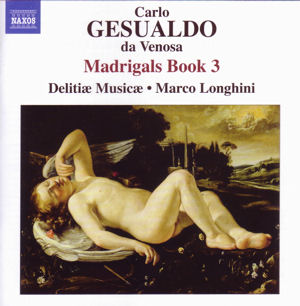 |
 |
|


alternatively
CD:
MDT
AmazonUK
AmazonUS
Sound Samples & Downloads
|
Carlo GESUALDO DA VENOSA (1566-1613)
Madrigals Book 3 (1595)
1. Voi volete ch’io mora (part 1) [1:34]
2. Moro o non moro (part 2) [2:59]
3. Ahi, disperata vita [2:15]
4. Languisco e moro [4:54]
5. Del bel de’ bei vostri occhi [2:36]
6. Ahi, dispietata e cruda [3:35]
7. Dolce spirto d’amore [3:31]
8. Sospirava il mio core (part 1) [2:52]
9. O mal nati messaggi (part 2) [3:11]
10. Veggio, sý, dal mio sole [2:39]
11. Non t’amo, o voce ingrata [2:48]
12. Meraviglia d’amore (part 1) [1:23]
13. Ed ardo e vivo (part 2) [1:56]
14. Crudelissima doglia [3:32]
15. Se piange, ohimŔ [3:56]
16. Ancidetemi pur, grievi martiri [3:53]
17. Se vi miro pietosa [2:41]
18. Deh, se giÓ fu crudele [2:41]
19. Dolcissimo sospiro [3:52]
20. Donna se m’ancidete (a sei voci) [3:01]
21. Come vivi cor mio (canzonetta) [4:38]
22. All’ombra degli allori (canzonetta) [4:06]
 DelitiŠ MusicŠ (Alessandro Carmignani; Paolo Costa; Fabio F¨rnari; Raffaele Giordani; Marco Scavazza; Walter Testolin)/Marco Longhini
DelitiŠ MusicŠ (Alessandro Carmignani; Paolo Costa; Fabio F¨rnari; Raffaele Giordani; Marco Scavazza; Walter Testolin)/Marco Longhini
rec. 27 July – 1 August, 2008, Chiesa di San Pietro in Vincoli, Azzogo, Verona, Italy
 NAXOS 8.572136 [68:37]
NAXOS 8.572136 [68:37] 
|
|
|
This beautifully presented disc is the third in a sequence of
six covering Gesualdo’s entire output of madrigals and secular
works. The first two issues attracted an enthusiastic critical
reception; this third is of particular interest in that it marks
the turning point in Gesualdo’s musical idiom from a more conventional
style to that for which he is most celebrated: arresting dissonances,
a marked intensity, concision and directness of address to create
pathos and drama. In other words, as one reviewer elsewhere
aptly puts it, “seriously weird”.
Published in 1595, these madrigals are also important and unusual
in that they constitute perhaps the first example of output
by an artist who, being an aristocrat himself, was free from
the constraints of patronage and could exercise his artistic
autonomy to ignore the criteria for approval and success. Not
only could he introduce whatever innovations he chose into his
musical language but he could also set texts by whomever he
pleased. Indeed, he rejected verse regularly and humbly submitted
to him by Torquato Tasso in favour of lesser or even anonymous
poets. He was thus, as Longhini suggests, possibly “the first
composer in history to have had the luxury of pursuing art for
art’s sake.”
The scandalous and turbulent events of his discovering and murdering
his wife and lover in flagrante delicto are too well
known to bear repetition (but see);
the evidence of Gesualdo’s tortured contrition is all over the
music which is markedly darker and more obsessive than in Book
Two. He was legally immune from prosecution on the grounds that
he was both a nobleman and merely a perpetrator of “crimes of
honour”, but threats of revenge and general condemnation dogged
him. The marks made on his mental health and his subsequent
descent into chronic depression are typified in his most famous
madrigal “Ancidetemi pur, grieve martiri” (“Do not kill me,
grievous suffering”). Key emotive words and phrases such as
“martire”, “dolore” and “tormento” and “questa misera vita”
(“this wretched life of mine”) are repeatedly emphasised by
their stark original musical treatment. For once, the tired
banalities of the language of courtly love have their roots
in real, rather than feigned or formulaic, suffering. Gesulado
had apparently sincerely loved his wife, his cousin whom he
had known since childhood, and was equally sincerely conscience-stricken
by the extraordinary violence of his vengeance upon her and
Fabrizio Carafa.
The singing here is of a high order: intonation is impeccable
and the blend of voices agreeably smooth. The counter-tenors
are free of squall or hoot and the bass does not groan. Seven
tracks, including the two concluding bonus items, feature an
accompaniment by a “clavicembalo” - a harpsichord to you and
me. Otherwise the emphasis is upon a capella purity.
The microphone placement in this recording is very close to
the singers but that, if anything, reveals how precise and subtly
graded their singing is. There is still a wide spread of sound,
allowing you to hear individual lines clearly. The vocal colouring
and shading of dynamics are exquisite: when they sing “gli estremi
miei sospiri”. Their voices really do sigh and die. Notes are
held steadily with minimal vibrato or none at all. Pauses and
rubato are employed judiciously and effectively without obviousness.
The sound of the Veronese church location is warm and full yet
the singers’ diction is crystal clear - nothing like native
Italians in such music with undistorted vowels, crisp consonants
and neatly trilled Rs. The freedom and invention of Gesualdo’s
chromatic harmonies and rhythms are sometimes startling. Listening
to a whole hour of such unvaryingly sombre and self-pitying
music can be wearing, but that may be addressed by an appreciation
of the vitality and variety of the singing of DelitiŠ MusicŠ.
A more practical solution to potential overload is to listen
to no more than twenty pieces at a sitting.
There are two bonus tracks: a pair of “canzonette” published
in 1618 to complete the survey of the Gesualdo canon.
The elegant booklet includes a full, informative and scholarly
essay by editor, conductor and producer Marco Longhini, biographies,
Italian texts and English translations. The cover is graced
by tastefully selected artwork. This all serves to continue
a very welcome pattern. This series clearly marks a highpoint
in the Naxos Early Music catalogue.
Ralph Moore
see also review by Mark
Sealey
|
|












